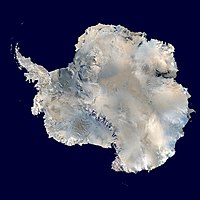
Photo from wikipedia
Abstract We examine Earth’s polar motion (PM) for the years 1979–2010 to understand climate related sources of PM excitation at periods longer than a year, and to investigate Antarctic and… Click to show full abstract
Abstract We examine Earth’s polar motion (PM) for the years 1979–2010 to understand climate related sources of PM excitation at periods longer than a year, and to investigate Antarctic and Greenland ice mass balance contributions to long period PM. There is particular interest in years prior to the GRACE mission (prior to 2002). Although long period PM is dominantly a measure of changes in two spherical harmonic Stokes coefficients (ΔC 21 and ΔS 21 ), we remove excitations due to winds and currents by estimating them from ERA-Interim winds and GECCO2 currents. PM estimates of ΔC 21 and ΔS 21 are compared with model estimates of contributions from the atmosphere, oceans, water stored on the continents, and polar ice sheets. We also include contributions from groundwater depletion and mountain glaciers. PM Stokes coefficient variations agree very well with model estimates over inter-annual time scales. For ΔC 21 we find good agreement at long periods, with a common long-period (quadratic) variation, but not for ΔS 21 . This suggests deficiencies in understanding long period ice mass variations in Antarctica and/or groundwater mass changes in Eurasia and North America.
Journal Title: Journal of Geodynamics
Year Published: 2017
Link to full text (if available)
Share on Social Media: Sign Up to like & get
recommendations!